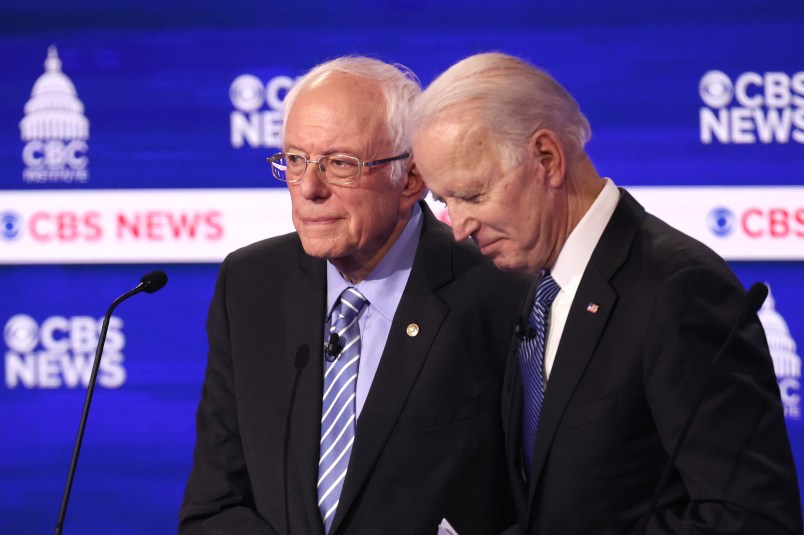Sunday night’s Democratic primary debate offers the first face-to-face discussion between former Vice President Joe Biden and Sen. Bernie Sanders (I-VT) since Super Tuesday, when Biden changed the course of the race with a string of commanding victories.
Biden kept his lead on Tuesday another successful night, perhaps most notably in Michigan, where Sanders pulled off a surprise victory against Hillary Clinton in 2016. This time around, Biden won every county in the state.
So the stakes have changed. Here’s what we’re looking for.
Coronavirus Looms Large
Biden and Sanders on Thursday both delivered speeches on how they would respond to the crisis as president, differentiating themselves from each other and the President.
Both candidates emphasized the need for social isolation to slow the disease’s spread, a competent bipartisan approach to fighting the disease at the federal level, and emphasized the need for public and private sector cooperation amid the crisis. Both also cited support for emergency universal paid sick leave and short-term economic stimulus measures, among other steps.
Sanders, for his part, put more emphasis on the needs of specific communities that are vulnerable to COVID-19 — for example the elderly, incarcerated, and homeless — while Biden emphasized the need for international cooperation and leadership during the global pandemic. Sanders called for a moratorium on evictions and the construction of emergency shelters, Biden called for a fund to support local governments and for pulling additional health care workers into the fight.
Dr. Laura H. Kahn, a public health researcher at Princeton and author of “Who’s in Charge? Leadership During Epidemics, Bioterror Attacks, and Other Public Health Crises,” noted to TPM that President Donald Trump has provided an easy foil for the candidates.
Trump, she said, “is making all the classic mistakes” of pandemic response: Belittling the crisis, providing false reassurances, not accepting expert advice and not putting qualified people in place.
“They have a national voice,” Kahn said of Biden and Sanders, before stressing the need for the candidates to use Sunday’s debate to promote the idea that the Americans must collectively work to combat the virus through social distancing: “That’s the kind of leadership that we need,” Kahn said.
Sanders Pushes Biden Left
The Vermont senator’s strategy seems to have shifted slightly since he was the singular frontrunner, back before the South Carolina primary. In a speech he gave after Tuesday’s disappointing performance, he telegraphed that he would press Biden on the left-wing positions that have defined Sanders’ career.
“Joe,” Sanders began each line in the speech, before asking Biden whether he would support a slew of progressive agenda items, including forgiving student and medical debt and providing free health care, addressing climate change through green energy, and “importantly,” Sanders said, addressing campaign finance reform and wealth inequality.
“On Sunday, I very much look forward to the debate in Arizona with my friend, Joe Biden,” Sanders said, adding that he was being “very frank” about his debate strategy of pressing Biden on his priorities.
If Sanders is ultimately unable to make up the ground between Biden’s delegate count and his own, Sunday’s debate may present the best chance to get the former Vice President on the record on a number of agenda items close to Sanders’ heart.
No More Audience, Only Two Candidates
The structure of this debate will also depart dramatically from past events, perhaps allowing each candidate to make their cases in greater detail.
The last Democratic presidential primary debate, which took place in South Carolina on Feb. 25, featured seven candidates: In addition to Biden and Sanders, also onstage were Sen. Elizabeth Warren (D-MA), Sen. Amy Klobuchar (D-MN), former South Bend Mayor Pete Buttigieg, Former New York City Mayor Michael Bloomberg and Tom Steyer.
All of those candidates have dropped out of the race since then. Due to a rule change from the Democratic Party, Rep. Tulsi Gabbard (D-HI) will also not be on stage, though her candidacy continues. So Biden and Sanders will have far more screen time on Sunday than in any other debate this cycle.
The COVID-19 pandemic has also changed things: Rather than being held in front of a live audience in Phoenix, the debate will be taped live in an otherwise empty room in Washington, D.C.
Moderator Jorge Ramos has dropped from the ticket, due to being near someone who in turn had been in contact with someone who was confirmed to have COVID-19. Univision anchor Ilia Calderon will take his place, alongside CNN’s Dana Bash and Jake Tapper.







What We’re Watching For At Sunday’s Democratic Presidential Primary Debate
Bernie to recognize the inevitable reality that Trump, not Biden, is the danger, and to step aside graciously?
Joe: (1) Stay Cool (2) Be yourself
Democrats and like minded people of all stripes are voting for you. Sanders is fighting an uphill battle and he is an aggressive person. Use that to your advantage.
Is there a president in the house?
Asking for a country.
I’m not watching at all and, with both candidates at or past the age of 70, they are both at risk for exposure even with the limited activity. Joe is sort of local, but Bernie may not be (if he went home or anywhere else during the last week).
None of this is necessary. None of it. If we can cancel sporting events, then this should be cancelled as well. Hell, we’re even postponing primaries, for G’d’s sake…This is irresponsible on all parts.
I’m watching for Bernie to recognize that it’s over.
Sure, he has a shot, if he wins every single state from here on out by at least 10 points.
But that guy is gonna ride that dead horse all the way to the convention.